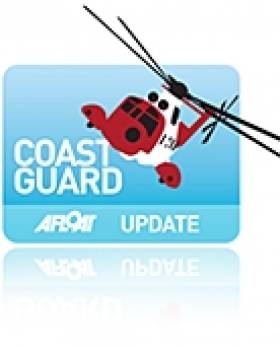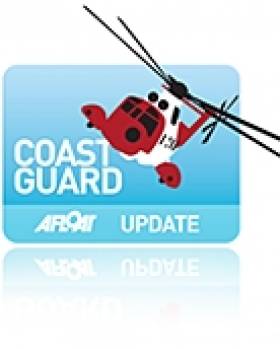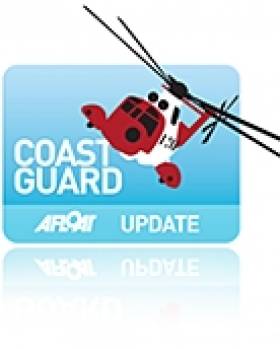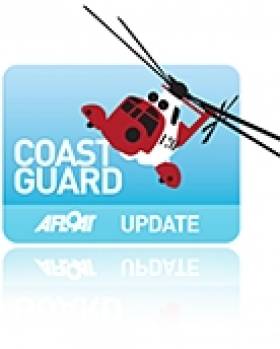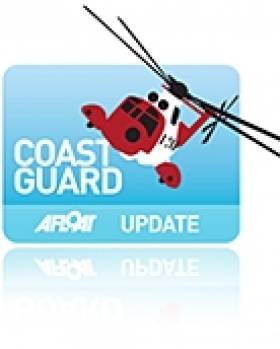Displaying items by tag: CHC
CHC Search and Rescue Crew Concerned About Jobs After Bristow Secures Irish Coast Guard Contract
Search and rescue air crew and staff at the Irish Coast Guard’s four helicopter bases are concerned about their future employment when Bristow takes over the new contract.
As The Sunday Independent reports, staff in Dublin, Waterford, Shannon and Sligo are seeking assurances from the Department of Transport that employment will be transferred when the Bristow group takes over in 2025.
Last week, Minister for Transport Eamon Ryan confirmed that Bristow Ireland Ltd is the preferred bidder for the next ten-year search and rescue (SAR) contract, costing 670 million euro ex VAT.
Over 140 people have been employed by CHC Ireland at the four bases over the past 20 years of the current contract, which cost 60 million euro annually.
Bristow Ireland Ltd is a subsidiary of the Bristow group which runs search and rescue services for Britain, the Netherlands and the Falkland Islands.
For the first time, provision of a fixed wing aircraft is also included in the Irish contract, which provides for the Air Corps to take over this element of the service after five years, according to Ryan.
Senator Gerard Craughwell, who has welcomed the awarding of the contract to Bristow, has called on the company to make a statement that it will “start considering a transfer of employment”.
Forsa, which represents air crew, said it would prefer not to comment at this stage, while trade union Unite regional officer Rob Kelly said it was “confident that the TUPE process will proceed smoothly, and Unite members look forward to continuing to provide this vital service".
CHC Ireland lost four of its air crew when the Dublin-based Sikorsky S-92 crashed at Blackrock island in north Mayo on March 14th, 2017, claiming the lives of Capt Dara Fitzpatrick, Capt Mark Duffy, and winch crew Ciarán Smith and Paul Ormsby.
The Department of Transport said that “it is expected that as part of their staffing strategy, the new contractor will undertake a consultation and engagement process with the employees of the current contractor, and the recognised trade unions”.
“As the procurement process has now entered the required legal “standstill period”, the department is not in a position to comment further,” a spokesperson said.
Bristow Ireland said “looks forward to integrating our significant global experience and capabilities into this critical public service” and would work with the department.
Read more in The Sunday Independent here
Award for Helicopter Crews 'Outstanding Service' to Irish Maritime Search and Rescue
One of the world's leading helicopter services company, CHC has built up an unparalleled reputation for excellence in SAR aviation over 20 years of operations for the Irish Coast Guard.
The tireless efforts of the team, who provide a 24-hour a day service from their Shannon base, has seen them awarded a special Directors Award for Outstanding Service to maritime search and rescue in Ireland.
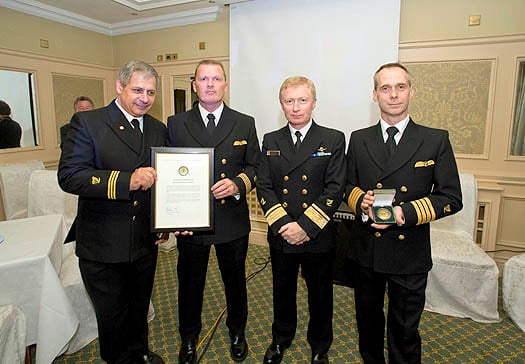
Top Brass: (from left to right) Paul Truss, Eamonn O'Broin, Chris Reynolds and Liam Flynn
The award recognises the personal commitment of all the crews, engineers and staff that have, over a period of two decades from 1991 to 2011, significantly enhanced Ireland's ability to affect a successful rescue and saved many lives.
It was accepted by Shannon Chief Pilot Captain Liam Flynn, Chief Crewman Eamonn O'Broin and Base Manager Paul Truss. Director of the Irish Coast Guard, Chris Reynolds, presented the award at a screening of a television documentary about the unit in Ennis.
The programme, called Rescue 115, will be aired on Irish channel RTE and will give people the opportunity to get an intimate view of what the crew does.
Mark Kelly, managing director of CHC in Ireland, said: "I would like to extend my heart felt congratulations to each and every member of the Shannon team past and present on the Directors Award in recognition of outstanding service to the State.
"The Directors Award is a very prestigious award which has only been given eight previous times.
"In presenting the award at the premiere of Rescue 115, Chris Reynolds spoke of the outstanding service given by the Shannon base and its staff to the State over the last twenty years, during which time it has carried out 3,732 missions.
"It is a well deserved recognition of two decades of tremendous courage, loyalty and dedication to providing a world class search and rescue service."
Earlier this year, a CHC SAR crew was recognised with a Best of Irish award for their role in successfully recovering the pilot of a light aircraft which crashed in the Irish Sea.
CHC Helicopter is the world's largest offshore helicopter operator and provides civilian search and rescue services in Ireland, the UK, Norway and Australia.
British Coastguard Fears Loss of Choppers
The union representing coastguard staff in the UK has expressed its fears over the loss of air rescue services when a number of helicopters are transferred to Ireland next year.
Under CHC's €500m contract to provide search and rescue services for the Irish Coast Guard, four helicopters will be withdrawn from England and Scotland for redeployment in Ireland.
However, HeraldScotland reports that the Maritime and Coastguard Agency (MCA) has no plans to replace these helicopters, which separately service Scotland's Isle of Lewis and Shetland Islands as well as the Solent and Portland in England.
The recent collapse of the privatisation deal for UK search and rescue services has meant there is no new operator lined up to replace CHC.
Jeremy Gautrey of the PCS union said that the situation "has now potentially left the coastguard service stranded without the guarantee that it will have sufficient helicopters to carry out search-and-rescue operations when the current helicopters retire."
HeraldScotland has more on the story HERE.
Search and Rescue Services Firm Reports Loss
The Canadian company that provides search and rescue helicopter services for the Coast Guard has reported a €1.5 million operating loss in the 2009-2010 fiscal year, according to the Irish Independent.
CHC Ireland, the local division of the world's largest helicopter services company, operates search and rescue services out of Dublin, Shannon, Waterford and Sligo.
Directors of the firm, which employs more than 100 nationwide, noted that the loss - coming after a €3.2 million loss in the previous financial year - was reduced due to the closure of its Cork base and lower aircraft leasing costs.
Last year the Government awarded CHC a new 10-year contract worth €500 million to operate search and rescue services, despite proposals from the Air Corps that it could provide the same service at a much lower rate.
The Irish Independent reported recently that one of the world's top helicopter makers has denied claims made by the Coast Guard that the Air Corps does not have the equipment to undertake search and rescue operations.
AgustaWestland, which supplies the main helicopter used by the Air Corps, disputed allegations by Coast Guard director Chris Reynolds that the AW139 had not earned a "good reputation" elsewhere.
Stornoway Helicopter Reports Busiest Year Ever
Scottish Coastguard rescue helicopter based in Stornoway has recorded its busiest ever year after clocking up in excess of 200 callouts in 2010.
It is the first time the rescue helicopter team has reached the milestone figure for missions in any one year, traditionally responding to an average of 136 callouts between January 1 and December 31. Since the introduction of the new technology S92 helicopters in 2007 however this has risen to an average of 190.
Leading search and rescue (SAR) service provider CHC Helicopter has operated the service for the Maritime and Coastguard Agency in the UK since 2007 from four bases at Stornoway, Sumburgh, Lee on Solent and Portland. Through its membership of the Soteria consortium, it has been identified as the preferred bidder on the UK SAR-H program, a 25-year contract to provide helicopter-based SAR services from 12 bases throughout the UK.
Ian McLuskie, UK SAR Business Unit Leader at CHC said: "The past three years have been the busiest we've ever had in terms of callouts and this is due to the capability of the S92 aircraft which are able to fly faster and further than those previously in use.
"This increased operating range and speed allows us to get to locations quicker, the overall result is a reduction in the time taken to rescue and get medical aid to those in need. This has allowed the unit to be called out to a greater number of jobs throughout the year, bringing the search and rescue service to a greater number of people and helping to save many more lives."
The Stornoway unit conducted its 200th mission on December 10th when rescue helicopter R100 was scrambled to evacuate a 57-year-old female who required urgent hospital treatment after experiencing breathing difficulties. The patient was transferred to Raigmore Hospital in Inverness.
The contract, will provide SAR services from bases at Waterford, Dublin, Shannon and Sligo from 2012 onwards. CHC already provides SAR services from these bases but the new contract will see the existing fleet of S-61N aircraft replaced with newer Sikorsky S-92A helicopters that are custom fitted for SAR work.
Irish Coast Guard Director Chris Reynolds said, "The Irish Coast Guard provides a diverse range of maritime and land-based SAR activities, ranging from national emergency situations such as the recent flooding seen in Ireland last winter to medevac from our Islands, mountains, fishing vessels and incidents involving leisure activity."
"It is essential we have the right stepped increase in capabilities going forward for the next decade. We are very confident in selecting CHC Helicopter that our decision will continue to deliver excellence, providing the most efficient and effective SAR service for Ireland."
The Irish contract cements CHC Helicopter's position as a world leader in provision of civilian SAR services. In addition to the service already provided in Ireland, CHC currently provides SAR coverage in Australia and the UK, and through its membership in the Soteria consortium, has been identified as the preferred bidder on the UK SAR-H program, a 25-year contract to provide helicopter-based SAR services from 12 bases throughout the UK.
"CHC is internationally recognised as a provider of effective SAR solutions to customers worldwide. In today's very challenging environment, we offer the most efficient, reliable and effective services using industry leading technology," said Tilmann Gabriel, chairman of CHC Ireland and president of CHC Helicopter's European Operations.
Mark Kelly, Managing Director of CHC Ireland, added that Irish citizens could now expect to see many positive changes arise.
"Over the next decade this contract will offer a number of service improvements including the ability to deliver a paramedic to any SAR incident within an hour anywhere on our coastline, ensuring much faster treatment of casualties," he said.
CHC is the world's largest operator of the Sikorsky S-92 helicopter that has a long and distinguished pedigree in SAR operations. There are currently more than 100 S-92 helicopters in operation around the world with a fleet total approaching 250,000 flight-hours.
The state-of-the-art twin-engine aircraft will be specially equipped for SAR operations and capable of flying faster and farther than aircraft currently in use. As well as longer range and improved cruising speeds, the S-92s will be equipped with enhanced rescue mission technology including infra-red and low light cameras, a Nightsun searchlight, a satellite communications system featuring a Flight Following tracking facility, and high speed dual hoists.


























